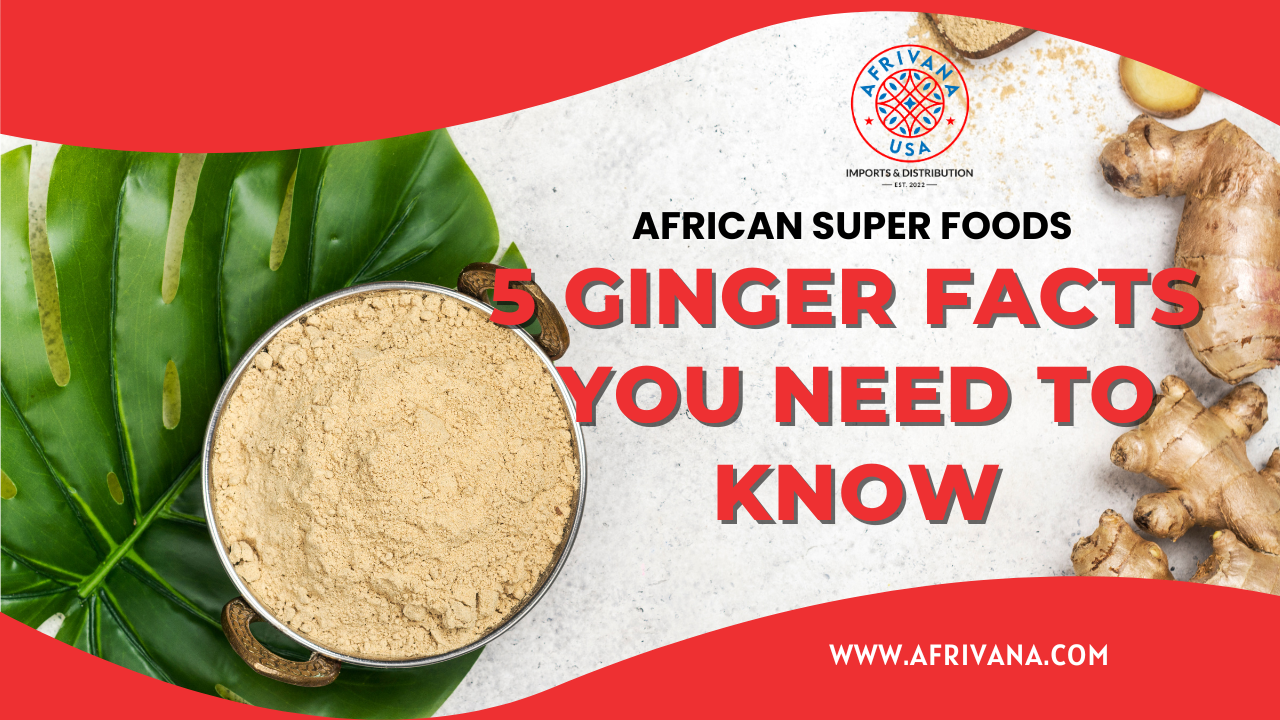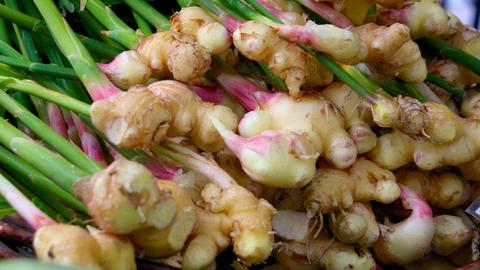African Superfoods
African Superfoods

What country do you think of when you think of ginger?
Did you know Ginger is also farmed and exported from Africa? Specifically dried ginger and ginger powder since they are easier to export in large quantities in these forms with lower the risk of spoiling.
Let's take a closer look at how ginger was used as ancient medicine and how Afrivana can be your direct from source supplier of dried ginger and other African Superfoods.
Ginger is a root that has been used for centuries for its medicinal properties in India, Asia, and Africa.
It contains compounds that have anti-inflammatory and antioxidant effects, making it a popular natural remedy for a range of ailments. Some of the benefits of ginger include relieving nausea, reducing inflammation, easing menstrual cramps, and aiding digestion. It can be consumed fresh, dried, powdered, or as a supplement.
 Let’s explore 5 Amazing Facts about Ginger you need to know.
Let’s explore 5 Amazing Facts about Ginger you need to know.
In ancient times, ginger was prized for its ability to treat a variety of ailments, from digestive issues to respiratory problems. Let's take a closer look at how ginger was used as ancient medicine.
Ancient China
In China, ginger was known as sheng jiang and was considered a warming herb. It was believed to help balance the body's yin and yang energies and was often used to treat digestive problems, including nausea, vomiting, and diarrhea. Ginger was also used to treat respiratory issues, like coughs, colds, and asthma. In addition, it was believed to improve blood circulation and reduce inflammation.
Ancient India
In India, ginger was known as adrak and was used in Ayurvedic medicine to treat a variety of conditions. It was believed to have a warming effect on the body and therefore used to stimulate digestion, reduce inflammation, and relieve pain. Ginger was also used to treat respiratory problems, like bronchitis and asthma, and was sometimes combined with other herbs for a soothing tea.
Ancient Greece and Rome
In ancient Greece and Rome, ginger was known as zingiberis like its scientific name, and was used as a digestive aid. It was often eaten after meals as a digestive aid to relieve bloating and gas. Ginger was also used to treat menstrual cramps and other types of pain because of its anti-inflammatory properties, as well as to reduce fever and general inflammation.
Other ancient cultures
Ginger was also used as a medicinal herb in other ancient cultures. In Japan, for example, it was used to treat stomach problems, while in medieval Europe, it was used to treat ailments like gout and rheumatism. In Arabic medicine, ginger was used to treat respiratory problems and as a natural aphrodisiac.
What about today?
Scientific research has confirmed many of the medicinal properties of ginger that ancient cultures knew centuries ago.. It has been found to have anti-inflammatory and antioxidant properties, as well as the ability to reduce nausea, improve digestion, and relieve pain. Ginger is often used as a natural remedy for conditions like osteoarthritis, menstrual cramps, and morning sickness.
Ginger has been used as a medicinal herb for thousands of years in various cultures around the world. Its ability to treat a variety of ailments, from digestive problems to respiratory issues, has been recognized and valued for centuries around the world.
Today, ginger continues to be a popular natural remedy for many health conditions.
2. It contains compounds called gingerols and shogaols that give it the anti-inflammatory and antioxidant properties.
Anti-oxidants are compounds that reduce and repair oxidation or the breakdown of the body through things like free-radicals and toxins that wear down the healthy tissues and throw off the balance of bodily systems. They are the needle in your tire and the wrench in your motor per se.
Gingerols and shogaols are two bioactive compounds found in ginger that are the sources of many of its health benefits. Both compounds are part of a larger class of compounds called gingerol derivatives, which are created and formed when gingerols are heated or dried.
Gingerols are the primary active compounds found in fresh ginger, while shogaols are formed when gingerols are dried or cooked. Shogaols are more potent than gingerols and are responsible for much of the spicy flavor and pungent aroma of ginger.
Studies have found that these compounds can inhibit the production of inflammatory cytokines and enzymes, which can contribute to chronic inflammation and various diseases.
3. Ginger can help alleviate nausea, especially in pregnant women and individuals undergoing chemotherapy. Let’s break down WHY
Gingerols and shogaols have been shown to have anti-cancer effects in laboratory studies. These compounds have proven to inhibit the growth and spread of cancer cells and to induce cancer cell death, which is necessary to stop the spread. While more research is needed to determine the exact mechanisms behind these effects, it'sbelieved that gingerols and shogaols may help prevent the formation of blood vessels that feed tumors, and may also have anti-inflammatory and antioxidant effects that contribute to their anti-cancer properties. It’s still benign studied how ginger is able to decipher what cells to target and induce cellular death.
Anti-nausea effects
Gingerols and shogaols are also known for their anti-nausea effects, meaning, they help you now throw up and can alleviate the feeling when induced by motion sickness.
Have you ever had ginger before going on a boat? These compounds can help reduce nausea and vomiting caused by motion sickness, pregnancy, and chemotherapy. it'sbelieved that these effects are due to the compounds' ability to block certain receptors in the brain that trigger nausea and vomiting.
4. Ginger has anti-inflammatory properties that may also help reduce muscle pain and soreness after exercise. How?
By Modulating pain receptors! Ginger has been shown to modulate pain receptors in the brain and nervous system so you don’t feel as much. This means that it can help reduce the sensation of pain by altering the way that pain signals are sent and received by the brain. Also, ginger may also help reduce the sensitivity of pain receptors, which can make them less responsive to painful stimuli. Think of it as a numbing affect to painful stimuli but not overall numbing like lidocaine.
5. Ginger can help lower blood sugar levels and improve heart health by reducing cholesterol and triglycerides. Here’s how.
By Reducing absorption of cholesterol. The gingerols and shogaols we talked about earlier have been shown to inhibit the absorption of cholesterol in the intestines. This can help reduce the amount of cholesterol that is absorbed into the bloodstream, which ultimately, can help lower overall cholesterol levels that cause high cholesterol of which many take daily medication for.
Ginger seems like a great addition to your natural wellness regimens if this is a concern of yours.
Ginger has also been found in studies to inhibit the activity of enzymes involved in cholesterol synthesis in the liver. This can help reduce the amount of cholesterol that is produced by the body, which can further help lower cholesterol levels.
Ginger has been shown to have triglyceride-lowering effects in both animal and human studies. It’s believed that this effect is due to the compound called 6-gingerol, which can increase the breakdown of triglycerides in fat cells and decrease their synthesis in the liver.
What about Blood Sugar management?
Insulin resistance is a common risk factor for both high cholesterol and triglyceride levels as seen in obese people and those with high fat and processed food diets. Ginger has been shown to improve insulin sensitivity, which can help reduce the risk of these conditions by allowing the body to break down sugar for energy versus storing it.
It's worth noting that while ginger may have some potential benefits for cholesterol and triglyceride levels, it's not a substitute for a healthy diet and lifestyle. To effectively manage cholesterol and triglycerides, it's important to follow a balanced diet that suits your biology, get daily exercise, and work with a healthcare provider to develop an appropriate treatment plan.
Now that we’ve blown your mind with all this wonderful benefits and mechanisms of ginger and how to use it for wellness, t's important to note that ginger may interact with certain medications and should be used with caution in individuals with certain medical conditions. Consult with a healthcare professional before using ginger as a natural treatment. It can be a great support to your regimen and overall wellness. You should also get ginger direct from the source in Africa by checking out AFRIVANA.
Shop Online for African Superfoods AFRIVANA.COM